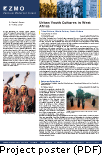 Urban
Youth Cultures in West Africa: Processes of Translocal Appropriation Urban
Youth Cultures in West Africa: Processes of Translocal Appropriation
Dr. Elisabeth Boesen
Dr. Marloes Janson
In the literature on African youth culture, ‘youth’
is frequently associated with social marginality, violence and
HIV/AIDS, and youthful cultural expressions are portrayed as symptoms
of crisis, anomie and degradation. Against this tendency, our
research project will study young people as agents rather than
victims of societal change by exploring their constructive and
creative potential. This potential is expressed on the one hand
in their appropriation and transformation of new global influences,
and on the other hand in the ways they represent themselves towards
the outside world. In the project two distinct forms of West African,
mainly urban, youth culture will be central. Boesen’s research
focuses on ethno-cultural manifestations in Niger, while Janson’s
research investigates religious beliefs and practices in The Gambia.
Both studies aim, on the basis of ethnographic field research,
to demonstrate that, although ‘youth’ can generally
be thought of as the period between childhood and adulthood, it
is an emergent category. As such, the project focuses on new ways
in which ‘youth’ is being conceptualized and experienced
through migration, cultural performances and Islamic reform in
West Africa.

Tribal culture, world culture, youth culture. Young Fulbe in town
Dr. Elisabeth
Boesen
The concept of “youth culture” is generally associated
with the idea of renewal, of a break with traditional values and
norms, of opposition and rebellion. Amongst the Fulbe-Wodaabe
of Central Niger, however, youth are responsible for the public
realisation of fundamental and shared social values. In the case
of the Wodaabe, youth culture is the essential realm of cultural
self-reflection. The dances staged by the young men during the
important seasonal lineage-meetings represent the central manifestation
of this youth culture. Originally, these dances took place in
an exclusively Wodaabe context and were designed to have an effect
in this internal social domain only, but since several decades
they also function as a medium of exchange with the outside world.
The project will investigate these new and predominantly urban
forms of exchange in which youth act as the preservers of their
culture while at the same time mediating new ideas and cultural
forms.

Islam as Subculture: The Gambian Tablīgh Jamā'at studied
as a Translocal Network for Youths in West Africa
Dr. Marloes
Janson
Despite its magnitude, relatively little academic attention has
been paid to the Tablīgh Jamā'at - a transnational Islamic
missionary movement - particularly with regard to sub-Saharan
Africa. My research will therefore focus on the Jamā'at in
The Gambia, which has become a flourishing centre of Tablīgh
activities in West Africa. What is striking is that, different
from South Asia where the movement originated, especially Gambian
youths feel attracted to its reformist ideology. The research
will explore how these young people - and female youths in particular
- have appropriated the Tablīgh ideology and adapted it to
the local, mostly urban, context in which they are operating.
By mapping the negotiations between the locally established Islam
propagated by more ‘mainstream’ Muslims (that is,
often the older generation) and urban Tablīghīs’
ideas that are derived from a South Asian setting and are influenced
by various West African reformist associations, my research will
contribute to the project on urban youth culture as process of
translocal appropriation. Studying the Tablīgh Jamā'at
from a translocal perspective is intended to provide an alternative
to essentialist concepts of Islam such as the notion of a syncretic
‘African Islam’ or a ‘fundamentalist Islam’.
The research will be mainly based on anthropological fieldwork
in Gambian urban settings. |